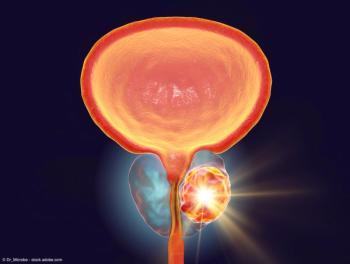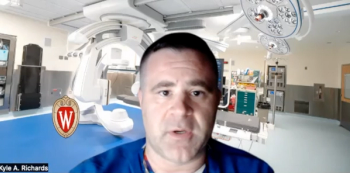
“We also found that socioeconomic disparities, which disproportionately affected African American patients with kidney cancer, play an important role in impacting survival in RCC,” says Nirmish Singla, MD, MSc.

“We also found that socioeconomic disparities, which disproportionately affected African American patients with kidney cancer, play an important role in impacting survival in RCC,” says Nirmish Singla, MD, MSc.

Alexandra Sokolova, MD, explains the importance of genetic testing for patients with high-risk localized and advanced prostate cancer, as well as for their high-risk family members.

“Our aim overall is to describe Medicare Part D prescription drug coverage and use of prior authorization and step therapy for these medications,” says Katherine Shapiro, MD.

"We really have to think beyond just the individual health impact to understand what's underlying these disparities," says Raveen Syan, MD, FPMRS.

“I think this study gives us actual numbers, so we can have a sense of how much time people will take off over time,” says Samuel L. Washington, MD, MAS.

“We looked at the costs of various quantities and strengths of sildenafil citrate [Viagra] and tadalafil [Cialis] from 3 three well-known direct-to-consumer online pharmacies, and we compared them to Cost Plus Drugs, an online pharmacy known for its competitive wholesale pricing,” says Jack Vercnocke, MD.

"It's not just teaching all about prostate cancer; it's real life and how people are experiencing prostate cancer," says David F. Mobley, MD.

"Although there may be some variety in prevalence and severity of disease, what's most striking is when we know a patient has that diagnosis, we have consistently found that minority women are less likely to receive treatments for overactive bladder," says Raveen Syan, MD, FPRMS.

"This is a whole other approach to treating patients with this cancer. If you think about that from the perspective of prostate cancer as a whole, this is a big deal," says Thomas A. Hope, MD.

“The goal of our work, essentially, was to leverage a national population-based cancer registry to comprehensively analyze multiple socioeconomic determinants of racial disparities and survival outcomes among nearly 400,000 patients with renal cell carcinoma,” says Nirmish Singla, MD, MSc.

"We had very high specificities. The specificities amongst the 3 readers ranged from 92% to 96%," says Phillip H. Kuo, MD, PhD, FACR.

“There are always other aspects of care other than that immediate treatment period that's needed,” says Samuel L. Washington III, MD.

"Overall, we found that there was a high detection rate in patients with PSA less than 1 ng/mL," says Ashesh B. Jani, MD, MSEE, FASTRO.

“In the bladder cancer field, there's been a renewed shift on looking at environmental exposures,” says Kyle A. Richards, MD, FACS.

"We'll have to obviously amend this document quickly as these drugs move earlier in the stage of disease," says Thomas A. Hope, MD.

"We're just trying to figure out ways to reduce our readmission rate, ways to reduce complications, and I think this is just a small step in doing that," says Randie White, MD.

“One of the things that the SMSNA does really well is promote, obviously, a lot of important learning, but also a lot of opportunities for networking,” says Matthew Ziegelmann, MD.

“We wound up finding that there was no difference in recurrence, no difference in secondary events, and no difference in our survival end points whether or not you were exposed to Agent Orange,” says Kyle A. Richards, MD, FACS.

“I think one of the most interesting things that we found is that our readmission rate was about 40%,” says Randie White, MD.

“It just gives us another piece of information that we can back up using data,” says Udit Singhal, MD.

“We wanted to look at, is there something to be said for delay in treatment or time to surgery?” says Randie White, MD.

"It's one of the hopes that our colleagues will recommend this book to their patients and their partners, so now they have a knowledgeable patient," says Neil H. Baum, MD.

"I think what should be more appropriate is that the initial treatment decision does not impact [survival], but I don't think you can say that intervening aggressively for this lethal disease does not alter the course," says Isaac Y. Kim, MD, PhD, MBA.

“The better our health care work force represents the patients we're trying to take care of, the better care we'll deliver and the better outcomes our patients will have,” says Christopher J.D. Wallis, MD, PhD.

“I think by applying these metrics that we've outlined in our manuscript, it's a perfect steppingstone in allowing urologists to take that step toward providing value-based care,” says Randall A. Lee, MD.

“I've always felt like my patients are my partners in discovery,” says Edward M. Schaeffer, MD, PhD.

“With regards to urinary function, there were actually no differences between the 2 eras. We thought that was a little surprising,” says Udit Singhal, MD.

“At this point, we really have to consider the hard work and next steps of setting up multi-institutional databases and registries aimed at drilling down on patient and provider factors and medical decision-making around this diagnosis,” says James Ferguson III, MD, PhD.

“I think the key to remember for a lot of what we're doing is that kidney stone disease is complicated. It's a really heterogenous patient population,” says Nicholas L. Kavoussi, MD.

“So many times, partners were left in the dark. They didn't have a clue what their partner who had prostate cancer was going through, and we felt that we could fill that void,” says Neil H. Baum, MD.